International Law: Implementation, Weaknesses, and Dispute Resolution
VerifiedAdded on 2023/04/23
|14
|4265
|223
Essay
AI Summary
This essay examines the significant weaknesses of the international legal system, focusing on the lack of effective implementation mechanisms and the limitations on intervening in domestic matters of sovereign states. It uses examples from South Asian countries like India, as well as developed nations like the USA and Australia, to illustrate how international law is often disregarded in favor of national interests. The essay proposes addressing these weaknesses by making adherence to international law mandatory for Security Council members and implementing punitive measures for violations. It further emphasizes the importance of leading nations setting an example by respecting international law in their own domestic policies, particularly concerning asylum seekers. Additionally, the essay explores peaceful implementation methods, focusing on state responsibility and dispute resolution through judicial and non-judicial procedures as outlined in the UN Charter, advocating for peaceful means of settling international disputes to maintain global security and justice. Desklib provides this essay and many more to aid students in their studies.
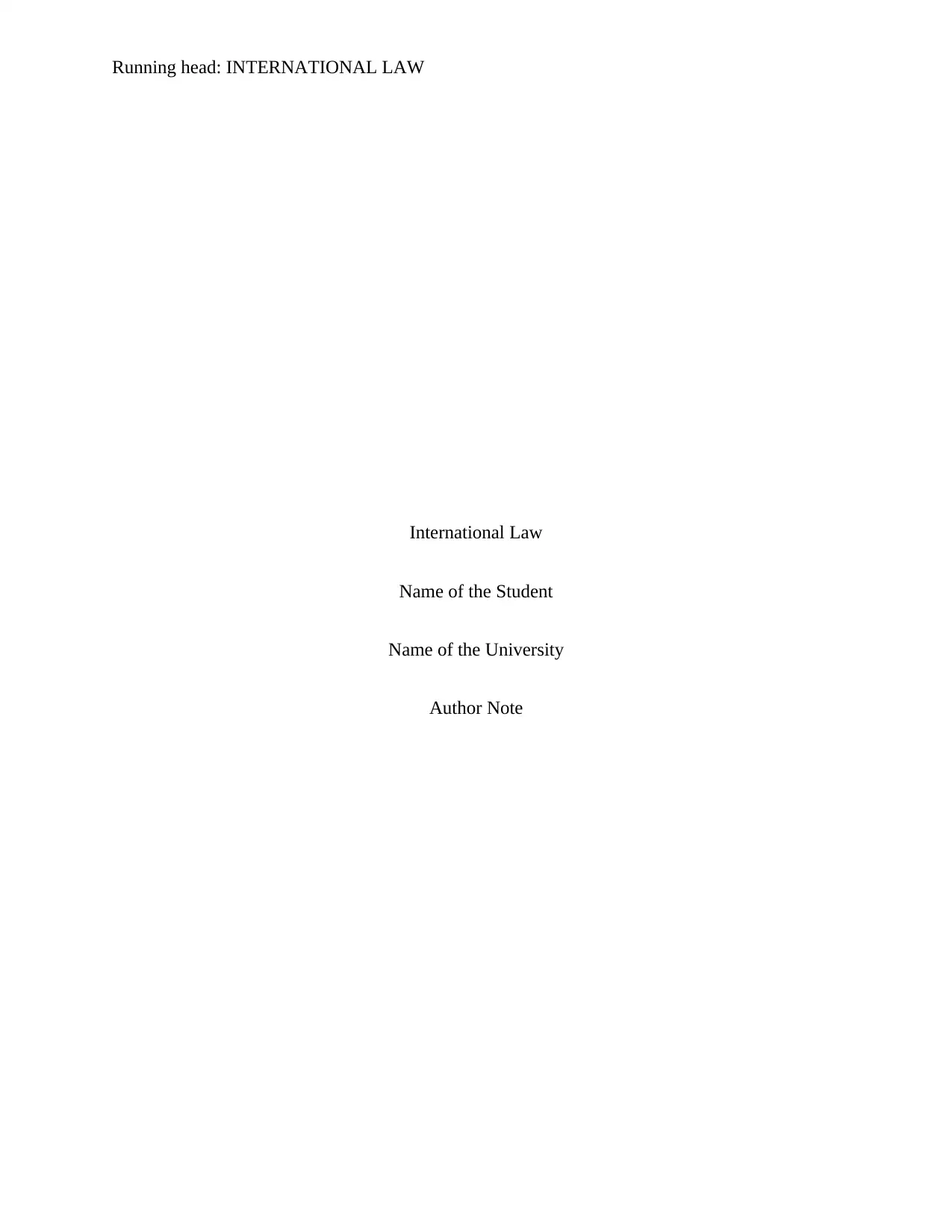
Running head: INTERNATIONAL LAW
International Law
Name of the Student
Name of the University
Author Note
International Law
Name of the Student
Name of the University
Author Note
Paraphrase This Document
Need a fresh take? Get an instant paraphrase of this document with our AI Paraphraser
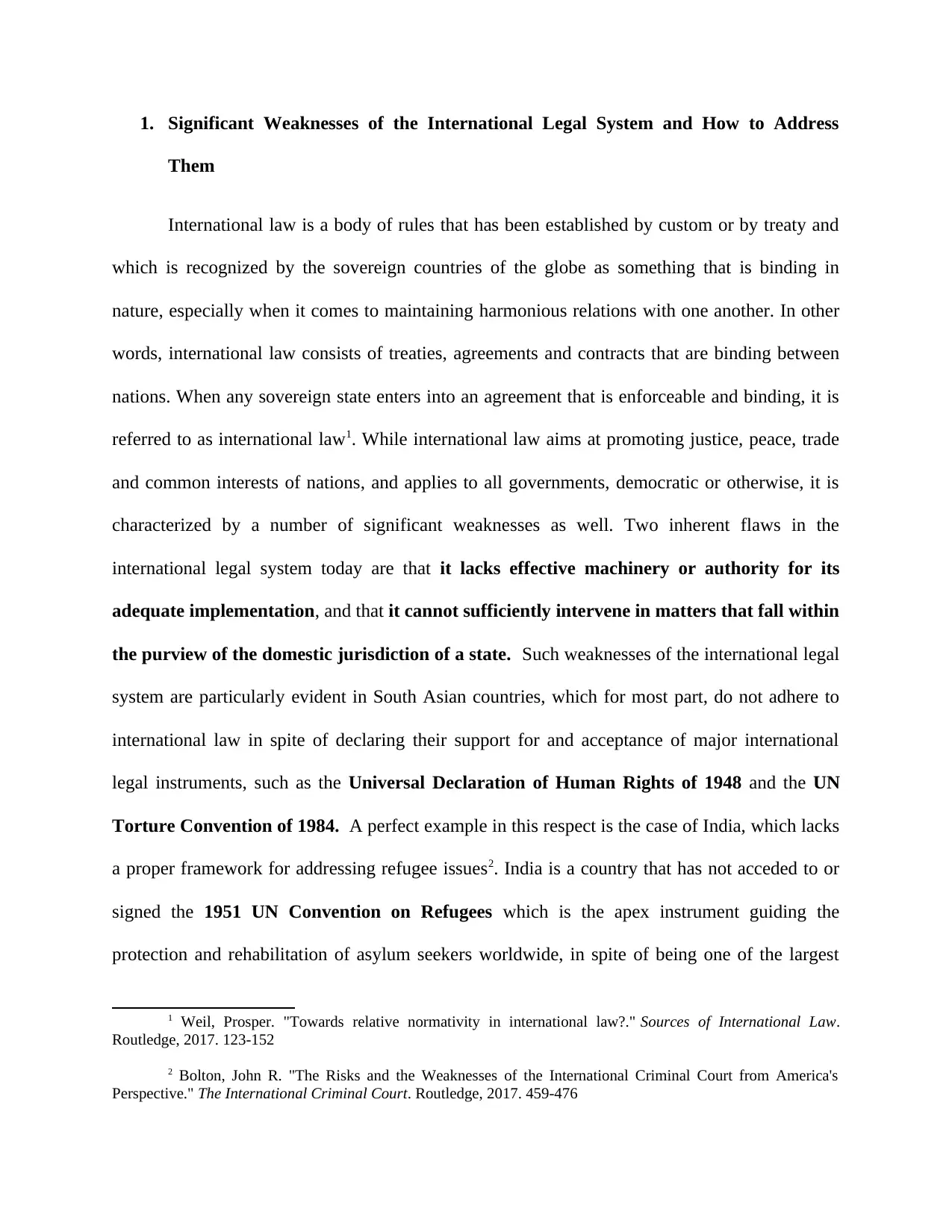
1. Significant Weaknesses of the International Legal System and How to Address
Them
International law is a body of rules that has been established by custom or by treaty and
which is recognized by the sovereign countries of the globe as something that is binding in
nature, especially when it comes to maintaining harmonious relations with one another. In other
words, international law consists of treaties, agreements and contracts that are binding between
nations. When any sovereign state enters into an agreement that is enforceable and binding, it is
referred to as international law1. While international law aims at promoting justice, peace, trade
and common interests of nations, and applies to all governments, democratic or otherwise, it is
characterized by a number of significant weaknesses as well. Two inherent flaws in the
international legal system today are that it lacks effective machinery or authority for its
adequate implementation, and that it cannot sufficiently intervene in matters that fall within
the purview of the domestic jurisdiction of a state. Such weaknesses of the international legal
system are particularly evident in South Asian countries, which for most part, do not adhere to
international law in spite of declaring their support for and acceptance of major international
legal instruments, such as the Universal Declaration of Human Rights of 1948 and the UN
Torture Convention of 1984. A perfect example in this respect is the case of India, which lacks
a proper framework for addressing refugee issues2. India is a country that has not acceded to or
signed the 1951 UN Convention on Refugees which is the apex instrument guiding the
protection and rehabilitation of asylum seekers worldwide, in spite of being one of the largest
1 Weil, Prosper. "Towards relative normativity in international law?." Sources of International Law.
Routledge, 2017. 123-152
2 Bolton, John R. "The Risks and the Weaknesses of the International Criminal Court from America's
Perspective." The International Criminal Court. Routledge, 2017. 459-476
Them
International law is a body of rules that has been established by custom or by treaty and
which is recognized by the sovereign countries of the globe as something that is binding in
nature, especially when it comes to maintaining harmonious relations with one another. In other
words, international law consists of treaties, agreements and contracts that are binding between
nations. When any sovereign state enters into an agreement that is enforceable and binding, it is
referred to as international law1. While international law aims at promoting justice, peace, trade
and common interests of nations, and applies to all governments, democratic or otherwise, it is
characterized by a number of significant weaknesses as well. Two inherent flaws in the
international legal system today are that it lacks effective machinery or authority for its
adequate implementation, and that it cannot sufficiently intervene in matters that fall within
the purview of the domestic jurisdiction of a state. Such weaknesses of the international legal
system are particularly evident in South Asian countries, which for most part, do not adhere to
international law in spite of declaring their support for and acceptance of major international
legal instruments, such as the Universal Declaration of Human Rights of 1948 and the UN
Torture Convention of 1984. A perfect example in this respect is the case of India, which lacks
a proper framework for addressing refugee issues2. India is a country that has not acceded to or
signed the 1951 UN Convention on Refugees which is the apex instrument guiding the
protection and rehabilitation of asylum seekers worldwide, in spite of being one of the largest
1 Weil, Prosper. "Towards relative normativity in international law?." Sources of International Law.
Routledge, 2017. 123-152
2 Bolton, John R. "The Risks and the Weaknesses of the International Criminal Court from America's
Perspective." The International Criminal Court. Routledge, 2017. 459-476
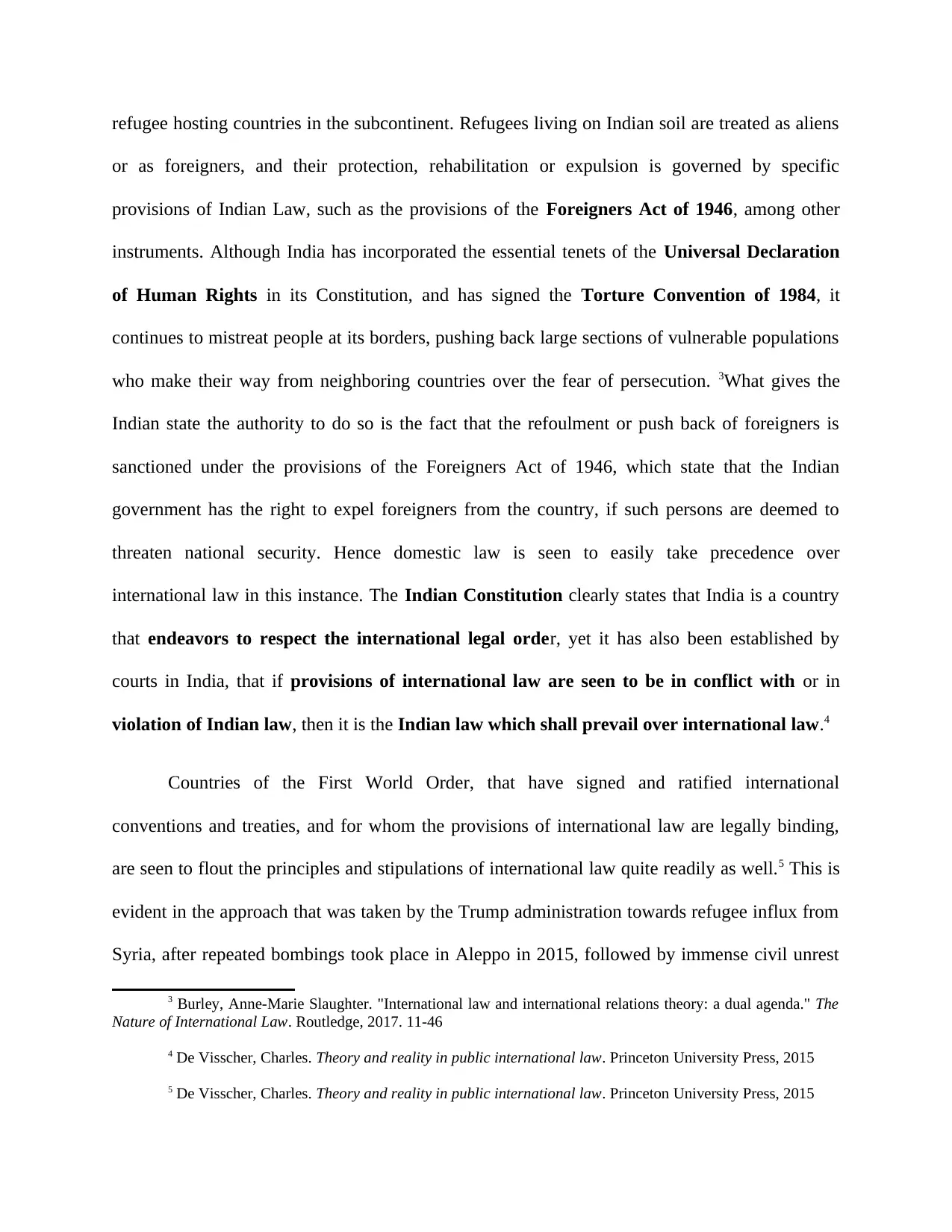
refugee hosting countries in the subcontinent. Refugees living on Indian soil are treated as aliens
or as foreigners, and their protection, rehabilitation or expulsion is governed by specific
provisions of Indian Law, such as the provisions of the Foreigners Act of 1946, among other
instruments. Although India has incorporated the essential tenets of the Universal Declaration
of Human Rights in its Constitution, and has signed the Torture Convention of 1984, it
continues to mistreat people at its borders, pushing back large sections of vulnerable populations
who make their way from neighboring countries over the fear of persecution. 3What gives the
Indian state the authority to do so is the fact that the refoulment or push back of foreigners is
sanctioned under the provisions of the Foreigners Act of 1946, which state that the Indian
government has the right to expel foreigners from the country, if such persons are deemed to
threaten national security. Hence domestic law is seen to easily take precedence over
international law in this instance. The Indian Constitution clearly states that India is a country
that endeavors to respect the international legal order, yet it has also been established by
courts in India, that if provisions of international law are seen to be in conflict with or in
violation of Indian law, then it is the Indian law which shall prevail over international law.4
Countries of the First World Order, that have signed and ratified international
conventions and treaties, and for whom the provisions of international law are legally binding,
are seen to flout the principles and stipulations of international law quite readily as well.5 This is
evident in the approach that was taken by the Trump administration towards refugee influx from
Syria, after repeated bombings took place in Aleppo in 2015, followed by immense civil unrest
3 Burley, Anne-Marie Slaughter. "International law and international relations theory: a dual agenda." The
Nature of International Law. Routledge, 2017. 11-46
4 De Visscher, Charles. Theory and reality in public international law. Princeton University Press, 2015
5 De Visscher, Charles. Theory and reality in public international law. Princeton University Press, 2015
or as foreigners, and their protection, rehabilitation or expulsion is governed by specific
provisions of Indian Law, such as the provisions of the Foreigners Act of 1946, among other
instruments. Although India has incorporated the essential tenets of the Universal Declaration
of Human Rights in its Constitution, and has signed the Torture Convention of 1984, it
continues to mistreat people at its borders, pushing back large sections of vulnerable populations
who make their way from neighboring countries over the fear of persecution. 3What gives the
Indian state the authority to do so is the fact that the refoulment or push back of foreigners is
sanctioned under the provisions of the Foreigners Act of 1946, which state that the Indian
government has the right to expel foreigners from the country, if such persons are deemed to
threaten national security. Hence domestic law is seen to easily take precedence over
international law in this instance. The Indian Constitution clearly states that India is a country
that endeavors to respect the international legal order, yet it has also been established by
courts in India, that if provisions of international law are seen to be in conflict with or in
violation of Indian law, then it is the Indian law which shall prevail over international law.4
Countries of the First World Order, that have signed and ratified international
conventions and treaties, and for whom the provisions of international law are legally binding,
are seen to flout the principles and stipulations of international law quite readily as well.5 This is
evident in the approach that was taken by the Trump administration towards refugee influx from
Syria, after repeated bombings took place in Aleppo in 2015, followed by immense civil unrest
3 Burley, Anne-Marie Slaughter. "International law and international relations theory: a dual agenda." The
Nature of International Law. Routledge, 2017. 11-46
4 De Visscher, Charles. Theory and reality in public international law. Princeton University Press, 2015
5 De Visscher, Charles. Theory and reality in public international law. Princeton University Press, 2015
⊘ This is a preview!⊘
Do you want full access?
Subscribe today to unlock all pages.

Trusted by 1+ million students worldwide
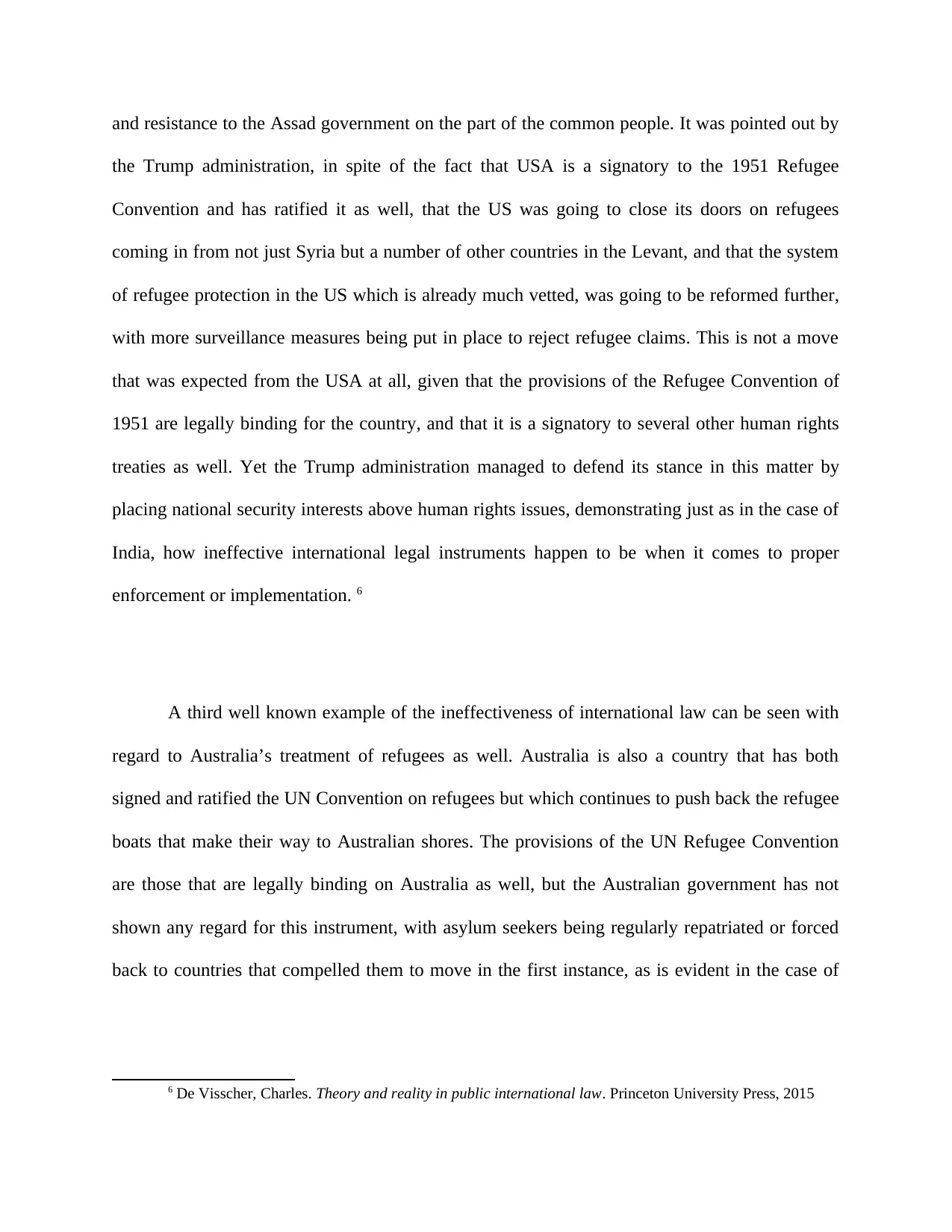
and resistance to the Assad government on the part of the common people. It was pointed out by
the Trump administration, in spite of the fact that USA is a signatory to the 1951 Refugee
Convention and has ratified it as well, that the US was going to close its doors on refugees
coming in from not just Syria but a number of other countries in the Levant, and that the system
of refugee protection in the US which is already much vetted, was going to be reformed further,
with more surveillance measures being put in place to reject refugee claims. This is not a move
that was expected from the USA at all, given that the provisions of the Refugee Convention of
1951 are legally binding for the country, and that it is a signatory to several other human rights
treaties as well. Yet the Trump administration managed to defend its stance in this matter by
placing national security interests above human rights issues, demonstrating just as in the case of
India, how ineffective international legal instruments happen to be when it comes to proper
enforcement or implementation. 6
A third well known example of the ineffectiveness of international law can be seen with
regard to Australia’s treatment of refugees as well. Australia is also a country that has both
signed and ratified the UN Convention on refugees but which continues to push back the refugee
boats that make their way to Australian shores. The provisions of the UN Refugee Convention
are those that are legally binding on Australia as well, but the Australian government has not
shown any regard for this instrument, with asylum seekers being regularly repatriated or forced
back to countries that compelled them to move in the first instance, as is evident in the case of
6 De Visscher, Charles. Theory and reality in public international law. Princeton University Press, 2015
the Trump administration, in spite of the fact that USA is a signatory to the 1951 Refugee
Convention and has ratified it as well, that the US was going to close its doors on refugees
coming in from not just Syria but a number of other countries in the Levant, and that the system
of refugee protection in the US which is already much vetted, was going to be reformed further,
with more surveillance measures being put in place to reject refugee claims. This is not a move
that was expected from the USA at all, given that the provisions of the Refugee Convention of
1951 are legally binding for the country, and that it is a signatory to several other human rights
treaties as well. Yet the Trump administration managed to defend its stance in this matter by
placing national security interests above human rights issues, demonstrating just as in the case of
India, how ineffective international legal instruments happen to be when it comes to proper
enforcement or implementation. 6
A third well known example of the ineffectiveness of international law can be seen with
regard to Australia’s treatment of refugees as well. Australia is also a country that has both
signed and ratified the UN Convention on refugees but which continues to push back the refugee
boats that make their way to Australian shores. The provisions of the UN Refugee Convention
are those that are legally binding on Australia as well, but the Australian government has not
shown any regard for this instrument, with asylum seekers being regularly repatriated or forced
back to countries that compelled them to move in the first instance, as is evident in the case of
6 De Visscher, Charles. Theory and reality in public international law. Princeton University Press, 2015
Paraphrase This Document
Need a fresh take? Get an instant paraphrase of this document with our AI Paraphraser
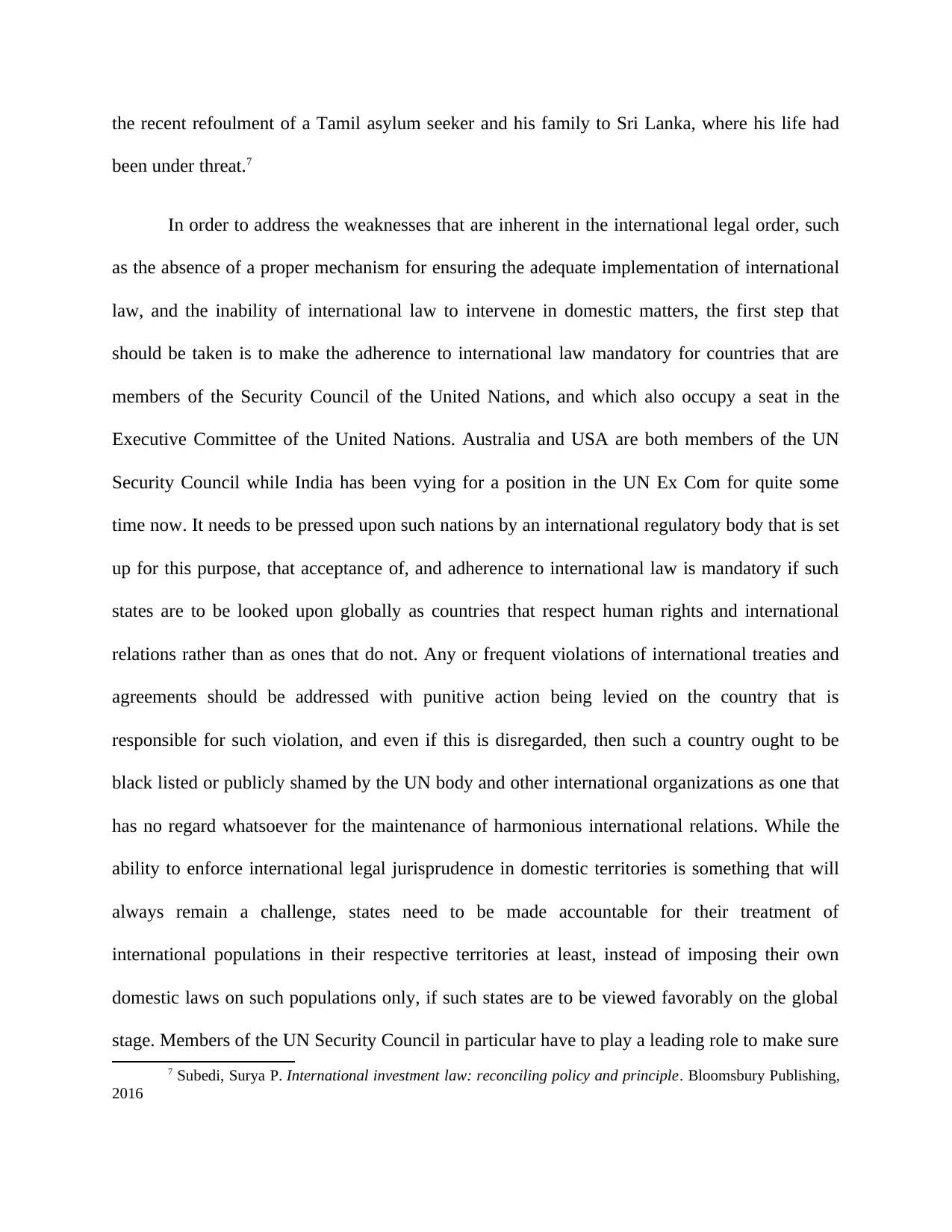
the recent refoulment of a Tamil asylum seeker and his family to Sri Lanka, where his life had
been under threat.7
In order to address the weaknesses that are inherent in the international legal order, such
as the absence of a proper mechanism for ensuring the adequate implementation of international
law, and the inability of international law to intervene in domestic matters, the first step that
should be taken is to make the adherence to international law mandatory for countries that are
members of the Security Council of the United Nations, and which also occupy a seat in the
Executive Committee of the United Nations. Australia and USA are both members of the UN
Security Council while India has been vying for a position in the UN Ex Com for quite some
time now. It needs to be pressed upon such nations by an international regulatory body that is set
up for this purpose, that acceptance of, and adherence to international law is mandatory if such
states are to be looked upon globally as countries that respect human rights and international
relations rather than as ones that do not. Any or frequent violations of international treaties and
agreements should be addressed with punitive action being levied on the country that is
responsible for such violation, and even if this is disregarded, then such a country ought to be
black listed or publicly shamed by the UN body and other international organizations as one that
has no regard whatsoever for the maintenance of harmonious international relations. While the
ability to enforce international legal jurisprudence in domestic territories is something that will
always remain a challenge, states need to be made accountable for their treatment of
international populations in their respective territories at least, instead of imposing their own
domestic laws on such populations only, if such states are to be viewed favorably on the global
stage. Members of the UN Security Council in particular have to play a leading role to make sure
7 Subedi, Surya P. International investment law: reconciling policy and principle. Bloomsbury Publishing,
2016
been under threat.7
In order to address the weaknesses that are inherent in the international legal order, such
as the absence of a proper mechanism for ensuring the adequate implementation of international
law, and the inability of international law to intervene in domestic matters, the first step that
should be taken is to make the adherence to international law mandatory for countries that are
members of the Security Council of the United Nations, and which also occupy a seat in the
Executive Committee of the United Nations. Australia and USA are both members of the UN
Security Council while India has been vying for a position in the UN Ex Com for quite some
time now. It needs to be pressed upon such nations by an international regulatory body that is set
up for this purpose, that acceptance of, and adherence to international law is mandatory if such
states are to be looked upon globally as countries that respect human rights and international
relations rather than as ones that do not. Any or frequent violations of international treaties and
agreements should be addressed with punitive action being levied on the country that is
responsible for such violation, and even if this is disregarded, then such a country ought to be
black listed or publicly shamed by the UN body and other international organizations as one that
has no regard whatsoever for the maintenance of harmonious international relations. While the
ability to enforce international legal jurisprudence in domestic territories is something that will
always remain a challenge, states need to be made accountable for their treatment of
international populations in their respective territories at least, instead of imposing their own
domestic laws on such populations only, if such states are to be viewed favorably on the global
stage. Members of the UN Security Council in particular have to play a leading role to make sure
7 Subedi, Surya P. International investment law: reconciling policy and principle. Bloomsbury Publishing,
2016
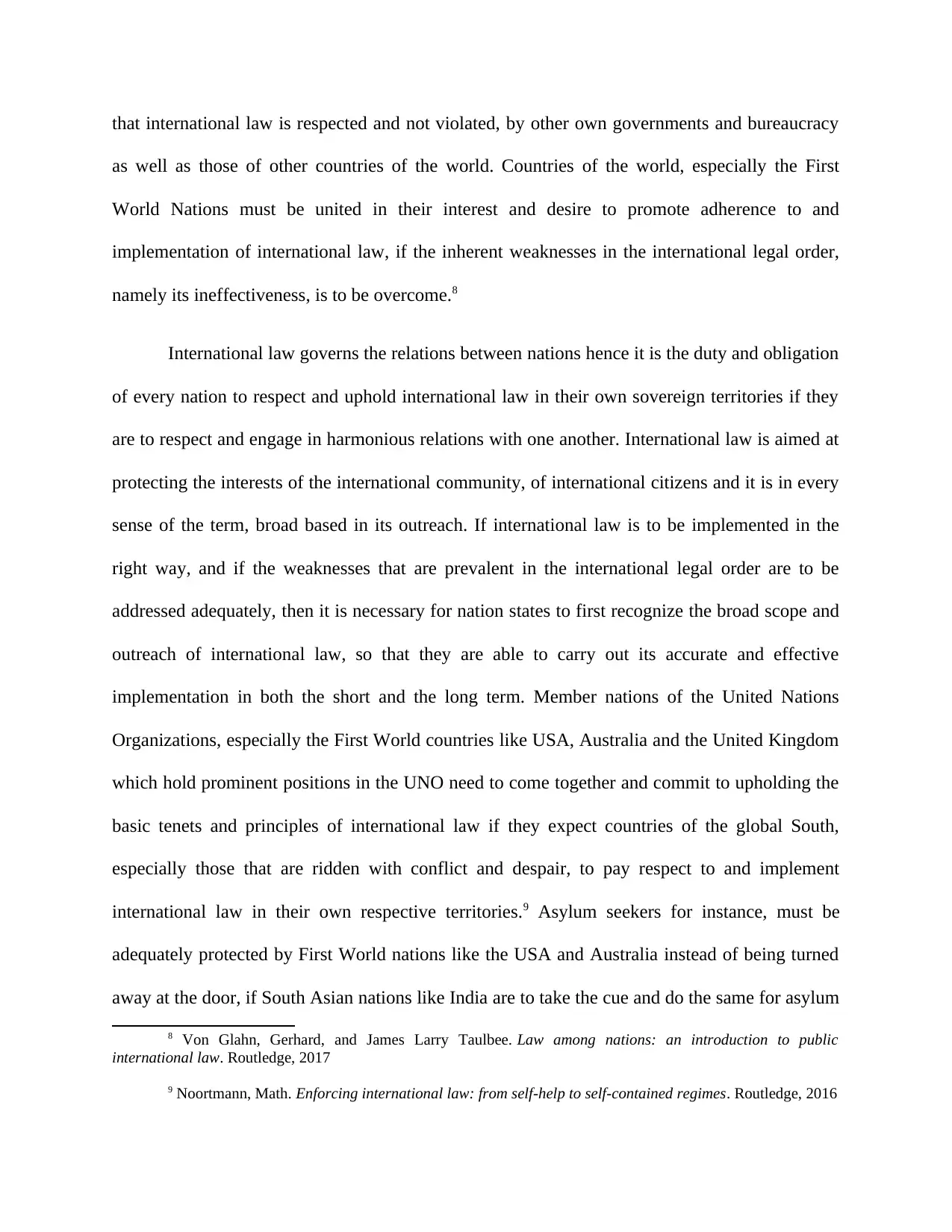
that international law is respected and not violated, by other own governments and bureaucracy
as well as those of other countries of the world. Countries of the world, especially the First
World Nations must be united in their interest and desire to promote adherence to and
implementation of international law, if the inherent weaknesses in the international legal order,
namely its ineffectiveness, is to be overcome.8
International law governs the relations between nations hence it is the duty and obligation
of every nation to respect and uphold international law in their own sovereign territories if they
are to respect and engage in harmonious relations with one another. International law is aimed at
protecting the interests of the international community, of international citizens and it is in every
sense of the term, broad based in its outreach. If international law is to be implemented in the
right way, and if the weaknesses that are prevalent in the international legal order are to be
addressed adequately, then it is necessary for nation states to first recognize the broad scope and
outreach of international law, so that they are able to carry out its accurate and effective
implementation in both the short and the long term. Member nations of the United Nations
Organizations, especially the First World countries like USA, Australia and the United Kingdom
which hold prominent positions in the UNO need to come together and commit to upholding the
basic tenets and principles of international law if they expect countries of the global South,
especially those that are ridden with conflict and despair, to pay respect to and implement
international law in their own respective territories.9 Asylum seekers for instance, must be
adequately protected by First World nations like the USA and Australia instead of being turned
away at the door, if South Asian nations like India are to take the cue and do the same for asylum
8 Von Glahn, Gerhard, and James Larry Taulbee. Law among nations: an introduction to public
international law. Routledge, 2017
9 Noortmann, Math. Enforcing international law: from self-help to self-contained regimes. Routledge, 2016
as well as those of other countries of the world. Countries of the world, especially the First
World Nations must be united in their interest and desire to promote adherence to and
implementation of international law, if the inherent weaknesses in the international legal order,
namely its ineffectiveness, is to be overcome.8
International law governs the relations between nations hence it is the duty and obligation
of every nation to respect and uphold international law in their own sovereign territories if they
are to respect and engage in harmonious relations with one another. International law is aimed at
protecting the interests of the international community, of international citizens and it is in every
sense of the term, broad based in its outreach. If international law is to be implemented in the
right way, and if the weaknesses that are prevalent in the international legal order are to be
addressed adequately, then it is necessary for nation states to first recognize the broad scope and
outreach of international law, so that they are able to carry out its accurate and effective
implementation in both the short and the long term. Member nations of the United Nations
Organizations, especially the First World countries like USA, Australia and the United Kingdom
which hold prominent positions in the UNO need to come together and commit to upholding the
basic tenets and principles of international law if they expect countries of the global South,
especially those that are ridden with conflict and despair, to pay respect to and implement
international law in their own respective territories.9 Asylum seekers for instance, must be
adequately protected by First World nations like the USA and Australia instead of being turned
away at the door, if South Asian nations like India are to take the cue and do the same for asylum
8 Von Glahn, Gerhard, and James Larry Taulbee. Law among nations: an introduction to public
international law. Routledge, 2017
9 Noortmann, Math. Enforcing international law: from self-help to self-contained regimes. Routledge, 2016
⊘ This is a preview!⊘
Do you want full access?
Subscribe today to unlock all pages.

Trusted by 1+ million students worldwide
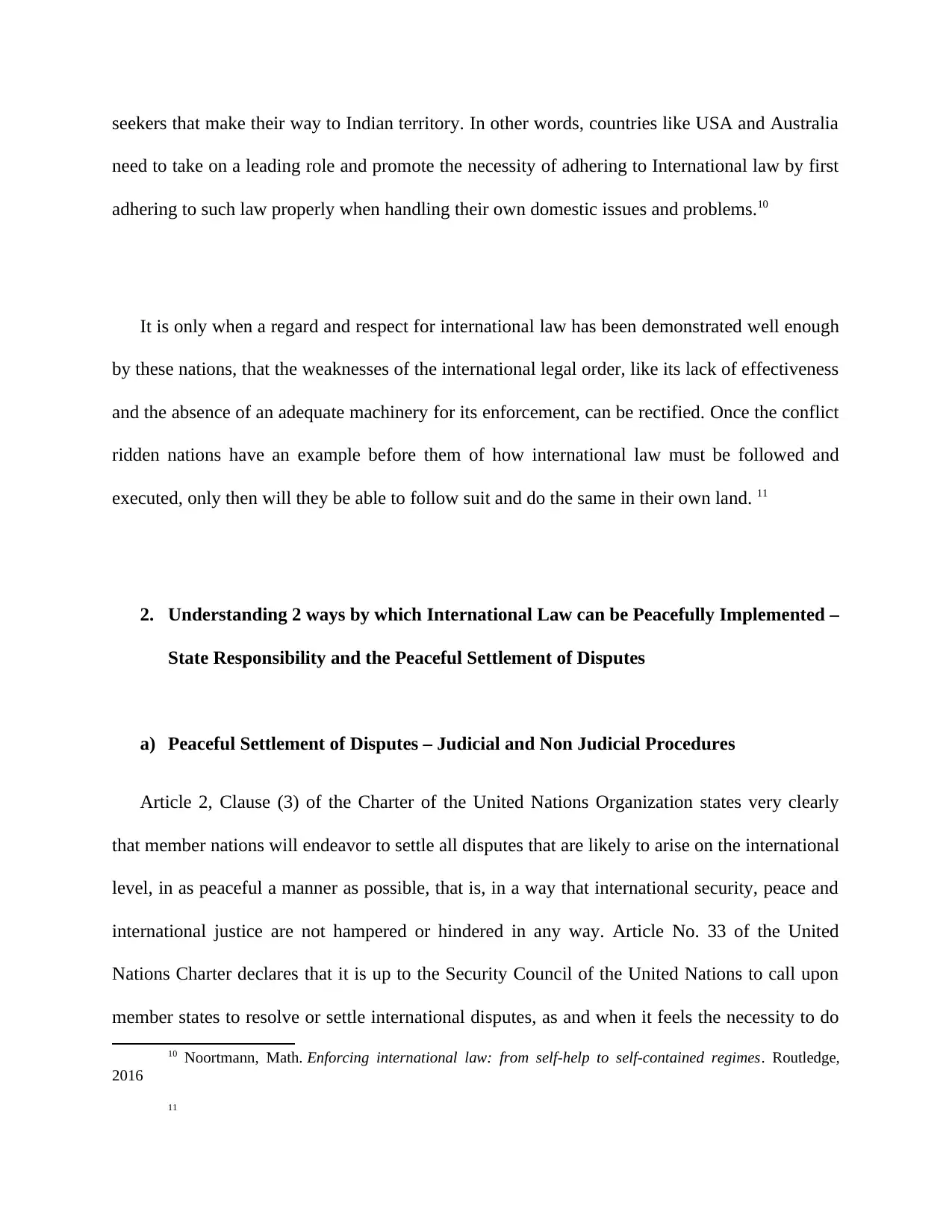
seekers that make their way to Indian territory. In other words, countries like USA and Australia
need to take on a leading role and promote the necessity of adhering to International law by first
adhering to such law properly when handling their own domestic issues and problems.10
It is only when a regard and respect for international law has been demonstrated well enough
by these nations, that the weaknesses of the international legal order, like its lack of effectiveness
and the absence of an adequate machinery for its enforcement, can be rectified. Once the conflict
ridden nations have an example before them of how international law must be followed and
executed, only then will they be able to follow suit and do the same in their own land. 11
2. Understanding 2 ways by which International Law can be Peacefully Implemented –
State Responsibility and the Peaceful Settlement of Disputes
a) Peaceful Settlement of Disputes – Judicial and Non Judicial Procedures
Article 2, Clause (3) of the Charter of the United Nations Organization states very clearly
that member nations will endeavor to settle all disputes that are likely to arise on the international
level, in as peaceful a manner as possible, that is, in a way that international security, peace and
international justice are not hampered or hindered in any way. Article No. 33 of the United
Nations Charter declares that it is up to the Security Council of the United Nations to call upon
member states to resolve or settle international disputes, as and when it feels the necessity to do
10 Noortmann, Math. Enforcing international law: from self-help to self-contained regimes. Routledge,
2016
11
need to take on a leading role and promote the necessity of adhering to International law by first
adhering to such law properly when handling their own domestic issues and problems.10
It is only when a regard and respect for international law has been demonstrated well enough
by these nations, that the weaknesses of the international legal order, like its lack of effectiveness
and the absence of an adequate machinery for its enforcement, can be rectified. Once the conflict
ridden nations have an example before them of how international law must be followed and
executed, only then will they be able to follow suit and do the same in their own land. 11
2. Understanding 2 ways by which International Law can be Peacefully Implemented –
State Responsibility and the Peaceful Settlement of Disputes
a) Peaceful Settlement of Disputes – Judicial and Non Judicial Procedures
Article 2, Clause (3) of the Charter of the United Nations Organization states very clearly
that member nations will endeavor to settle all disputes that are likely to arise on the international
level, in as peaceful a manner as possible, that is, in a way that international security, peace and
international justice are not hampered or hindered in any way. Article No. 33 of the United
Nations Charter declares that it is up to the Security Council of the United Nations to call upon
member states to resolve or settle international disputes, as and when it feels the necessity to do
10 Noortmann, Math. Enforcing international law: from self-help to self-contained regimes. Routledge,
2016
11
Paraphrase This Document
Need a fresh take? Get an instant paraphrase of this document with our AI Paraphraser
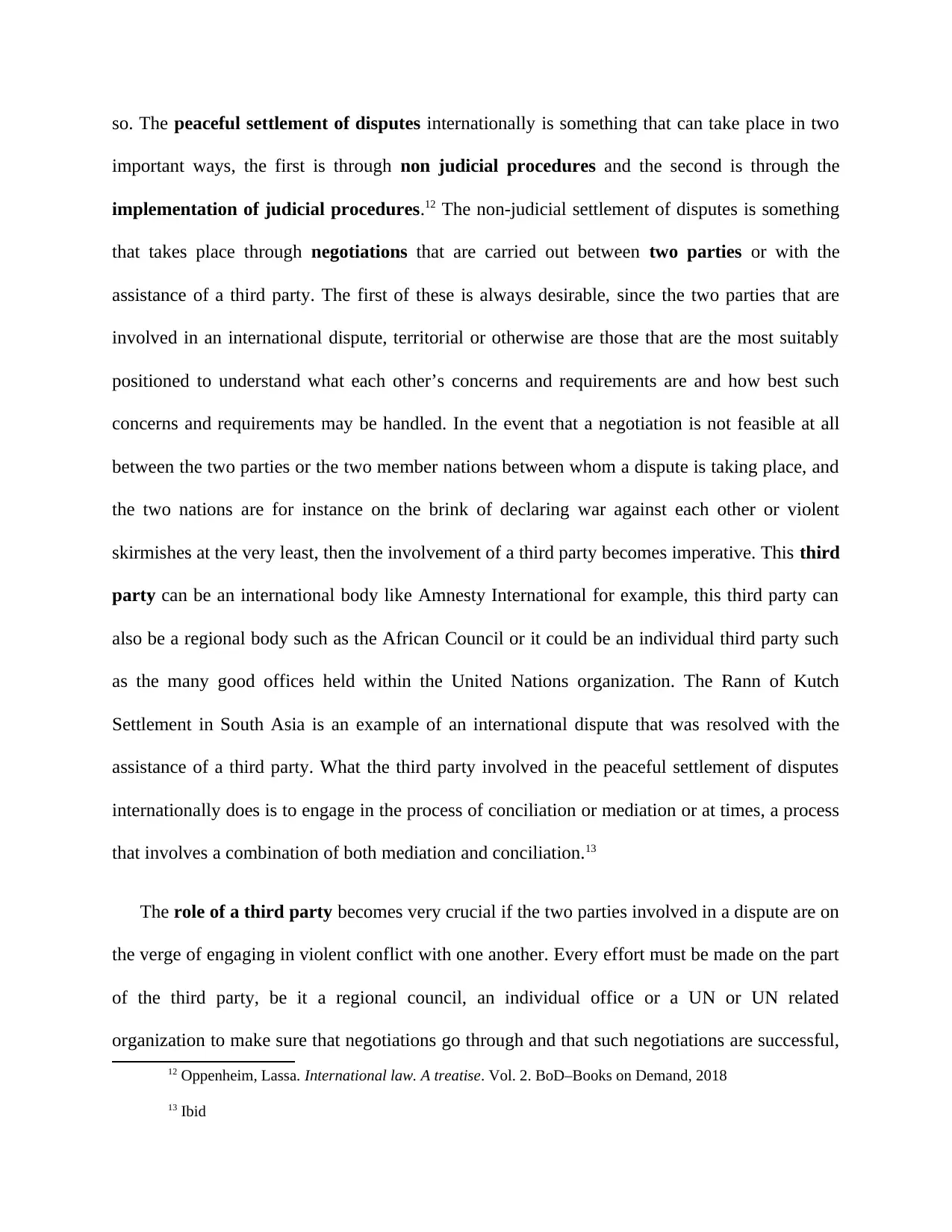
so. The peaceful settlement of disputes internationally is something that can take place in two
important ways, the first is through non judicial procedures and the second is through the
implementation of judicial procedures.12 The non-judicial settlement of disputes is something
that takes place through negotiations that are carried out between two parties or with the
assistance of a third party. The first of these is always desirable, since the two parties that are
involved in an international dispute, territorial or otherwise are those that are the most suitably
positioned to understand what each other’s concerns and requirements are and how best such
concerns and requirements may be handled. In the event that a negotiation is not feasible at all
between the two parties or the two member nations between whom a dispute is taking place, and
the two nations are for instance on the brink of declaring war against each other or violent
skirmishes at the very least, then the involvement of a third party becomes imperative. This third
party can be an international body like Amnesty International for example, this third party can
also be a regional body such as the African Council or it could be an individual third party such
as the many good offices held within the United Nations organization. The Rann of Kutch
Settlement in South Asia is an example of an international dispute that was resolved with the
assistance of a third party. What the third party involved in the peaceful settlement of disputes
internationally does is to engage in the process of conciliation or mediation or at times, a process
that involves a combination of both mediation and conciliation.13
The role of a third party becomes very crucial if the two parties involved in a dispute are on
the verge of engaging in violent conflict with one another. Every effort must be made on the part
of the third party, be it a regional council, an individual office or a UN or UN related
organization to make sure that negotiations go through and that such negotiations are successful,
12 Oppenheim, Lassa. International law. A treatise. Vol. 2. BoD–Books on Demand, 2018
13 Ibid
important ways, the first is through non judicial procedures and the second is through the
implementation of judicial procedures.12 The non-judicial settlement of disputes is something
that takes place through negotiations that are carried out between two parties or with the
assistance of a third party. The first of these is always desirable, since the two parties that are
involved in an international dispute, territorial or otherwise are those that are the most suitably
positioned to understand what each other’s concerns and requirements are and how best such
concerns and requirements may be handled. In the event that a negotiation is not feasible at all
between the two parties or the two member nations between whom a dispute is taking place, and
the two nations are for instance on the brink of declaring war against each other or violent
skirmishes at the very least, then the involvement of a third party becomes imperative. This third
party can be an international body like Amnesty International for example, this third party can
also be a regional body such as the African Council or it could be an individual third party such
as the many good offices held within the United Nations organization. The Rann of Kutch
Settlement in South Asia is an example of an international dispute that was resolved with the
assistance of a third party. What the third party involved in the peaceful settlement of disputes
internationally does is to engage in the process of conciliation or mediation or at times, a process
that involves a combination of both mediation and conciliation.13
The role of a third party becomes very crucial if the two parties involved in a dispute are on
the verge of engaging in violent conflict with one another. Every effort must be made on the part
of the third party, be it a regional council, an individual office or a UN or UN related
organization to make sure that negotiations go through and that such negotiations are successful,
12 Oppenheim, Lassa. International law. A treatise. Vol. 2. BoD–Books on Demand, 2018
13 Ibid
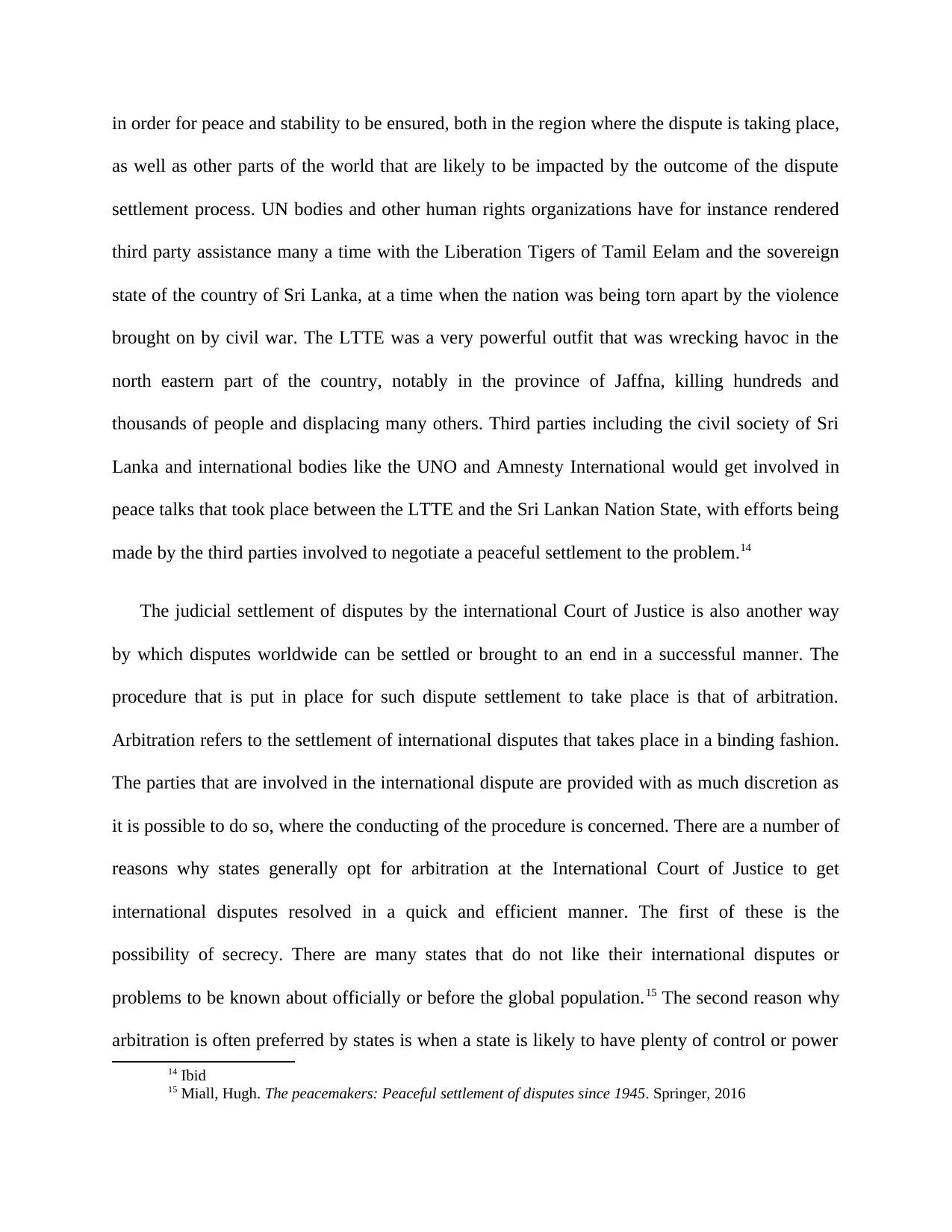
in order for peace and stability to be ensured, both in the region where the dispute is taking place,
as well as other parts of the world that are likely to be impacted by the outcome of the dispute
settlement process. UN bodies and other human rights organizations have for instance rendered
third party assistance many a time with the Liberation Tigers of Tamil Eelam and the sovereign
state of the country of Sri Lanka, at a time when the nation was being torn apart by the violence
brought on by civil war. The LTTE was a very powerful outfit that was wrecking havoc in the
north eastern part of the country, notably in the province of Jaffna, killing hundreds and
thousands of people and displacing many others. Third parties including the civil society of Sri
Lanka and international bodies like the UNO and Amnesty International would get involved in
peace talks that took place between the LTTE and the Sri Lankan Nation State, with efforts being
made by the third parties involved to negotiate a peaceful settlement to the problem.14
The judicial settlement of disputes by the international Court of Justice is also another way
by which disputes worldwide can be settled or brought to an end in a successful manner. The
procedure that is put in place for such dispute settlement to take place is that of arbitration.
Arbitration refers to the settlement of international disputes that takes place in a binding fashion.
The parties that are involved in the international dispute are provided with as much discretion as
it is possible to do so, where the conducting of the procedure is concerned. There are a number of
reasons why states generally opt for arbitration at the International Court of Justice to get
international disputes resolved in a quick and efficient manner. The first of these is the
possibility of secrecy. There are many states that do not like their international disputes or
problems to be known about officially or before the global population.15 The second reason why
arbitration is often preferred by states is when a state is likely to have plenty of control or power
14 Ibid
15 Miall, Hugh. The peacemakers: Peaceful settlement of disputes since 1945. Springer, 2016
as well as other parts of the world that are likely to be impacted by the outcome of the dispute
settlement process. UN bodies and other human rights organizations have for instance rendered
third party assistance many a time with the Liberation Tigers of Tamil Eelam and the sovereign
state of the country of Sri Lanka, at a time when the nation was being torn apart by the violence
brought on by civil war. The LTTE was a very powerful outfit that was wrecking havoc in the
north eastern part of the country, notably in the province of Jaffna, killing hundreds and
thousands of people and displacing many others. Third parties including the civil society of Sri
Lanka and international bodies like the UNO and Amnesty International would get involved in
peace talks that took place between the LTTE and the Sri Lankan Nation State, with efforts being
made by the third parties involved to negotiate a peaceful settlement to the problem.14
The judicial settlement of disputes by the international Court of Justice is also another way
by which disputes worldwide can be settled or brought to an end in a successful manner. The
procedure that is put in place for such dispute settlement to take place is that of arbitration.
Arbitration refers to the settlement of international disputes that takes place in a binding fashion.
The parties that are involved in the international dispute are provided with as much discretion as
it is possible to do so, where the conducting of the procedure is concerned. There are a number of
reasons why states generally opt for arbitration at the International Court of Justice to get
international disputes resolved in a quick and efficient manner. The first of these is the
possibility of secrecy. There are many states that do not like their international disputes or
problems to be known about officially or before the global population.15 The second reason why
arbitration is often preferred by states is when a state is likely to have plenty of control or power
14 Ibid
15 Miall, Hugh. The peacemakers: Peaceful settlement of disputes since 1945. Springer, 2016
⊘ This is a preview!⊘
Do you want full access?
Subscribe today to unlock all pages.

Trusted by 1+ million students worldwide
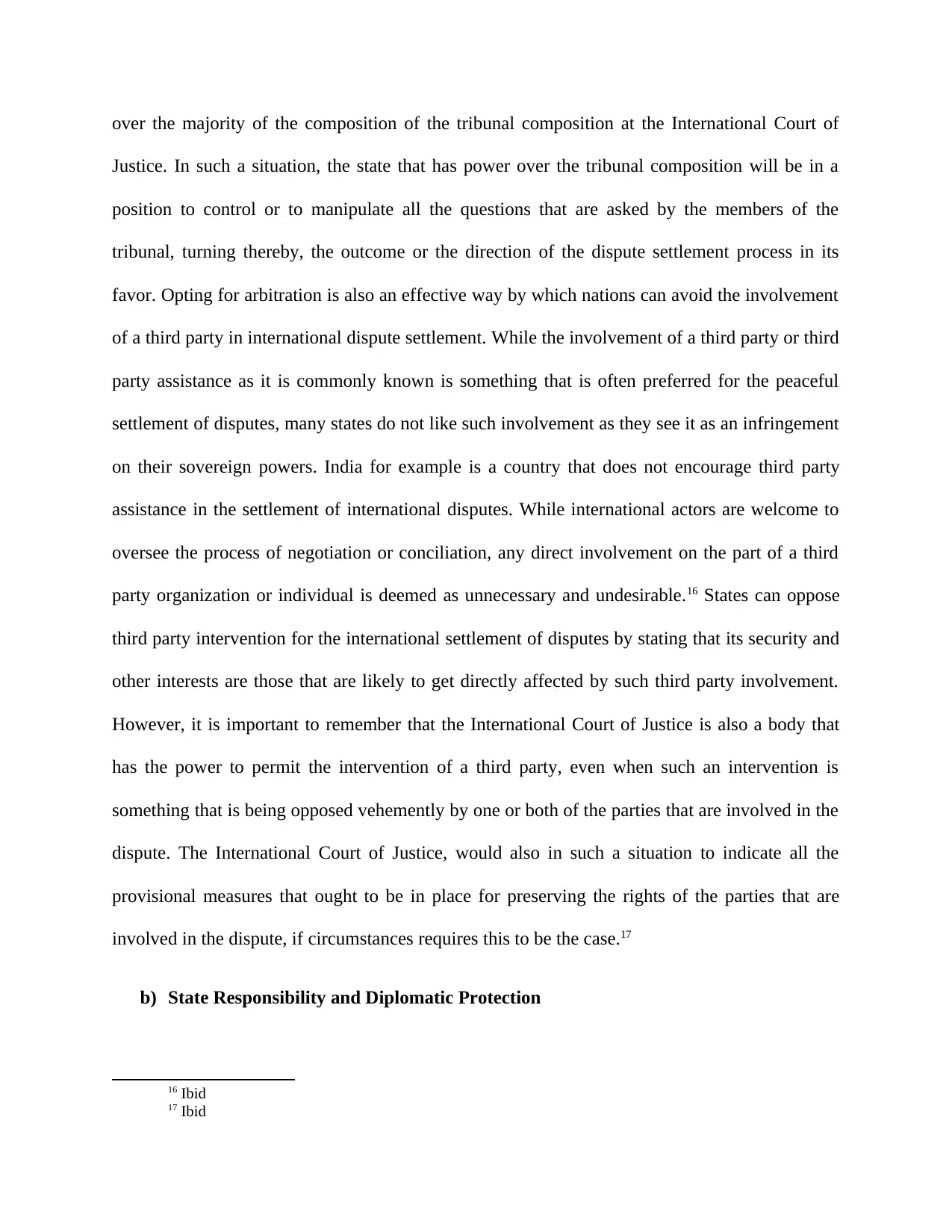
over the majority of the composition of the tribunal composition at the International Court of
Justice. In such a situation, the state that has power over the tribunal composition will be in a
position to control or to manipulate all the questions that are asked by the members of the
tribunal, turning thereby, the outcome or the direction of the dispute settlement process in its
favor. Opting for arbitration is also an effective way by which nations can avoid the involvement
of a third party in international dispute settlement. While the involvement of a third party or third
party assistance as it is commonly known is something that is often preferred for the peaceful
settlement of disputes, many states do not like such involvement as they see it as an infringement
on their sovereign powers. India for example is a country that does not encourage third party
assistance in the settlement of international disputes. While international actors are welcome to
oversee the process of negotiation or conciliation, any direct involvement on the part of a third
party organization or individual is deemed as unnecessary and undesirable.16 States can oppose
third party intervention for the international settlement of disputes by stating that its security and
other interests are those that are likely to get directly affected by such third party involvement.
However, it is important to remember that the International Court of Justice is also a body that
has the power to permit the intervention of a third party, even when such an intervention is
something that is being opposed vehemently by one or both of the parties that are involved in the
dispute. The International Court of Justice, would also in such a situation to indicate all the
provisional measures that ought to be in place for preserving the rights of the parties that are
involved in the dispute, if circumstances requires this to be the case.17
b) State Responsibility and Diplomatic Protection
16 Ibid
17 Ibid
Justice. In such a situation, the state that has power over the tribunal composition will be in a
position to control or to manipulate all the questions that are asked by the members of the
tribunal, turning thereby, the outcome or the direction of the dispute settlement process in its
favor. Opting for arbitration is also an effective way by which nations can avoid the involvement
of a third party in international dispute settlement. While the involvement of a third party or third
party assistance as it is commonly known is something that is often preferred for the peaceful
settlement of disputes, many states do not like such involvement as they see it as an infringement
on their sovereign powers. India for example is a country that does not encourage third party
assistance in the settlement of international disputes. While international actors are welcome to
oversee the process of negotiation or conciliation, any direct involvement on the part of a third
party organization or individual is deemed as unnecessary and undesirable.16 States can oppose
third party intervention for the international settlement of disputes by stating that its security and
other interests are those that are likely to get directly affected by such third party involvement.
However, it is important to remember that the International Court of Justice is also a body that
has the power to permit the intervention of a third party, even when such an intervention is
something that is being opposed vehemently by one or both of the parties that are involved in the
dispute. The International Court of Justice, would also in such a situation to indicate all the
provisional measures that ought to be in place for preserving the rights of the parties that are
involved in the dispute, if circumstances requires this to be the case.17
b) State Responsibility and Diplomatic Protection
16 Ibid
17 Ibid
Paraphrase This Document
Need a fresh take? Get an instant paraphrase of this document with our AI Paraphraser
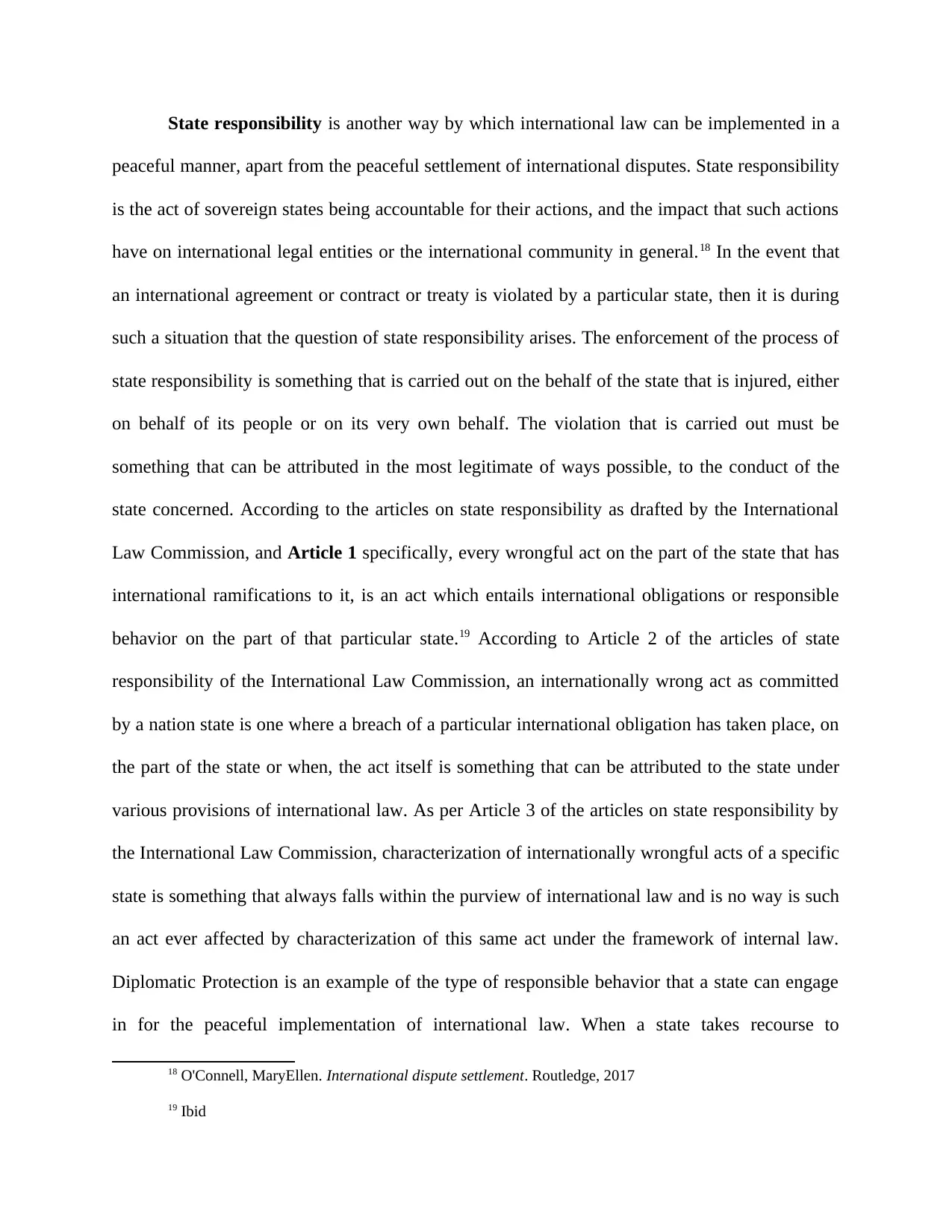
State responsibility is another way by which international law can be implemented in a
peaceful manner, apart from the peaceful settlement of international disputes. State responsibility
is the act of sovereign states being accountable for their actions, and the impact that such actions
have on international legal entities or the international community in general.18 In the event that
an international agreement or contract or treaty is violated by a particular state, then it is during
such a situation that the question of state responsibility arises. The enforcement of the process of
state responsibility is something that is carried out on the behalf of the state that is injured, either
on behalf of its people or on its very own behalf. The violation that is carried out must be
something that can be attributed in the most legitimate of ways possible, to the conduct of the
state concerned. According to the articles on state responsibility as drafted by the International
Law Commission, and Article 1 specifically, every wrongful act on the part of the state that has
international ramifications to it, is an act which entails international obligations or responsible
behavior on the part of that particular state.19 According to Article 2 of the articles of state
responsibility of the International Law Commission, an internationally wrong act as committed
by a nation state is one where a breach of a particular international obligation has taken place, on
the part of the state or when, the act itself is something that can be attributed to the state under
various provisions of international law. As per Article 3 of the articles on state responsibility by
the International Law Commission, characterization of internationally wrongful acts of a specific
state is something that always falls within the purview of international law and is no way is such
an act ever affected by characterization of this same act under the framework of internal law.
Diplomatic Protection is an example of the type of responsible behavior that a state can engage
in for the peaceful implementation of international law. When a state takes recourse to
18 O'Connell, MaryEllen. International dispute settlement. Routledge, 2017
19 Ibid
peaceful manner, apart from the peaceful settlement of international disputes. State responsibility
is the act of sovereign states being accountable for their actions, and the impact that such actions
have on international legal entities or the international community in general.18 In the event that
an international agreement or contract or treaty is violated by a particular state, then it is during
such a situation that the question of state responsibility arises. The enforcement of the process of
state responsibility is something that is carried out on the behalf of the state that is injured, either
on behalf of its people or on its very own behalf. The violation that is carried out must be
something that can be attributed in the most legitimate of ways possible, to the conduct of the
state concerned. According to the articles on state responsibility as drafted by the International
Law Commission, and Article 1 specifically, every wrongful act on the part of the state that has
international ramifications to it, is an act which entails international obligations or responsible
behavior on the part of that particular state.19 According to Article 2 of the articles of state
responsibility of the International Law Commission, an internationally wrong act as committed
by a nation state is one where a breach of a particular international obligation has taken place, on
the part of the state or when, the act itself is something that can be attributed to the state under
various provisions of international law. As per Article 3 of the articles on state responsibility by
the International Law Commission, characterization of internationally wrongful acts of a specific
state is something that always falls within the purview of international law and is no way is such
an act ever affected by characterization of this same act under the framework of internal law.
Diplomatic Protection is an example of the type of responsible behavior that a state can engage
in for the peaceful implementation of international law. When a state takes recourse to
18 O'Connell, MaryEllen. International dispute settlement. Routledge, 2017
19 Ibid
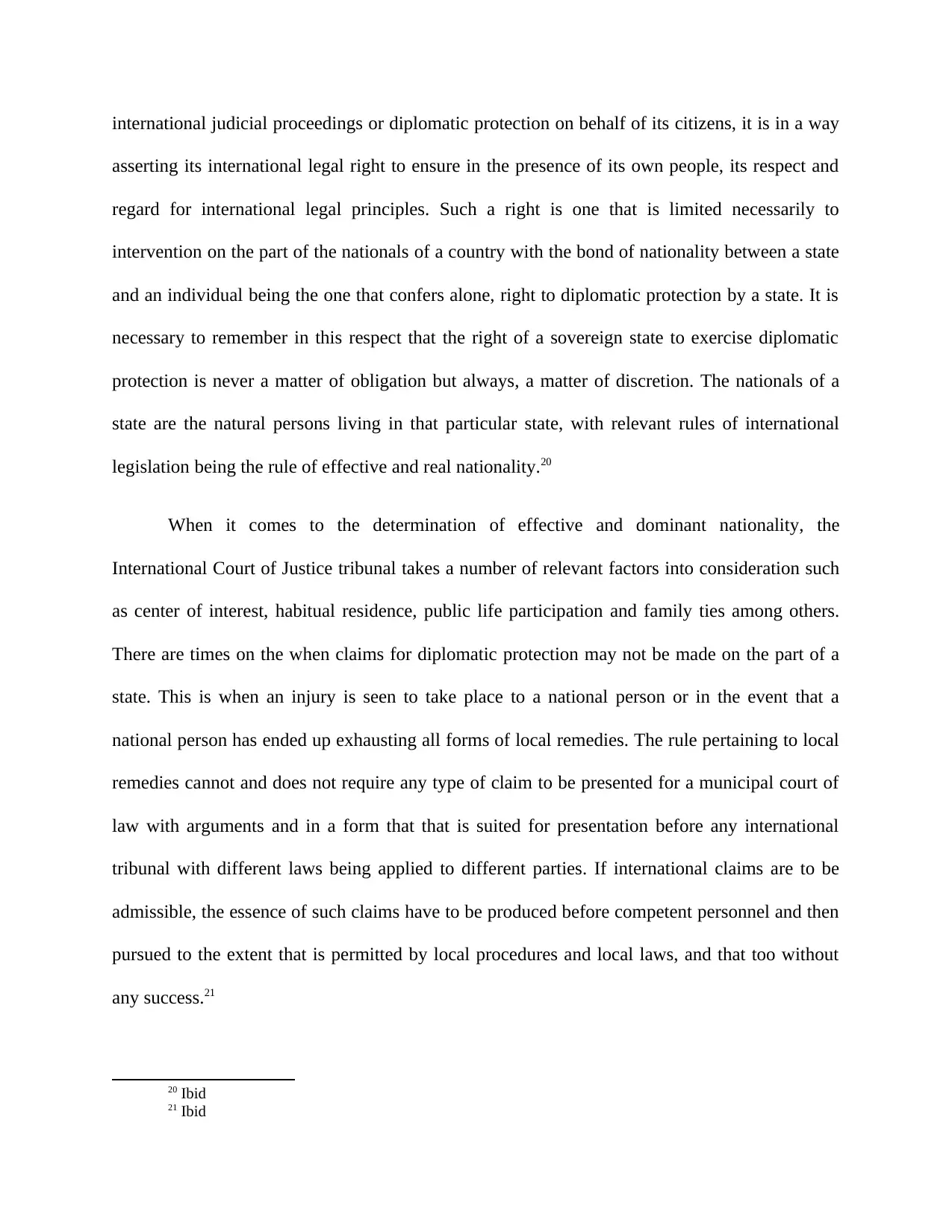
international judicial proceedings or diplomatic protection on behalf of its citizens, it is in a way
asserting its international legal right to ensure in the presence of its own people, its respect and
regard for international legal principles. Such a right is one that is limited necessarily to
intervention on the part of the nationals of a country with the bond of nationality between a state
and an individual being the one that confers alone, right to diplomatic protection by a state. It is
necessary to remember in this respect that the right of a sovereign state to exercise diplomatic
protection is never a matter of obligation but always, a matter of discretion. The nationals of a
state are the natural persons living in that particular state, with relevant rules of international
legislation being the rule of effective and real nationality.20
When it comes to the determination of effective and dominant nationality, the
International Court of Justice tribunal takes a number of relevant factors into consideration such
as center of interest, habitual residence, public life participation and family ties among others.
There are times on the when claims for diplomatic protection may not be made on the part of a
state. This is when an injury is seen to take place to a national person or in the event that a
national person has ended up exhausting all forms of local remedies. The rule pertaining to local
remedies cannot and does not require any type of claim to be presented for a municipal court of
law with arguments and in a form that that is suited for presentation before any international
tribunal with different laws being applied to different parties. If international claims are to be
admissible, the essence of such claims have to be produced before competent personnel and then
pursued to the extent that is permitted by local procedures and local laws, and that too without
any success.21
20 Ibid
21 Ibid
asserting its international legal right to ensure in the presence of its own people, its respect and
regard for international legal principles. Such a right is one that is limited necessarily to
intervention on the part of the nationals of a country with the bond of nationality between a state
and an individual being the one that confers alone, right to diplomatic protection by a state. It is
necessary to remember in this respect that the right of a sovereign state to exercise diplomatic
protection is never a matter of obligation but always, a matter of discretion. The nationals of a
state are the natural persons living in that particular state, with relevant rules of international
legislation being the rule of effective and real nationality.20
When it comes to the determination of effective and dominant nationality, the
International Court of Justice tribunal takes a number of relevant factors into consideration such
as center of interest, habitual residence, public life participation and family ties among others.
There are times on the when claims for diplomatic protection may not be made on the part of a
state. This is when an injury is seen to take place to a national person or in the event that a
national person has ended up exhausting all forms of local remedies. The rule pertaining to local
remedies cannot and does not require any type of claim to be presented for a municipal court of
law with arguments and in a form that that is suited for presentation before any international
tribunal with different laws being applied to different parties. If international claims are to be
admissible, the essence of such claims have to be produced before competent personnel and then
pursued to the extent that is permitted by local procedures and local laws, and that too without
any success.21
20 Ibid
21 Ibid
⊘ This is a preview!⊘
Do you want full access?
Subscribe today to unlock all pages.

Trusted by 1+ million students worldwide
1 out of 14
Your All-in-One AI-Powered Toolkit for Academic Success.
+13062052269
info@desklib.com
Available 24*7 on WhatsApp / Email
![[object Object]](/_next/static/media/star-bottom.7253800d.svg)
Unlock your academic potential
Copyright © 2020–2026 A2Z Services. All Rights Reserved. Developed and managed by ZUCOL.
